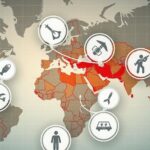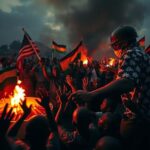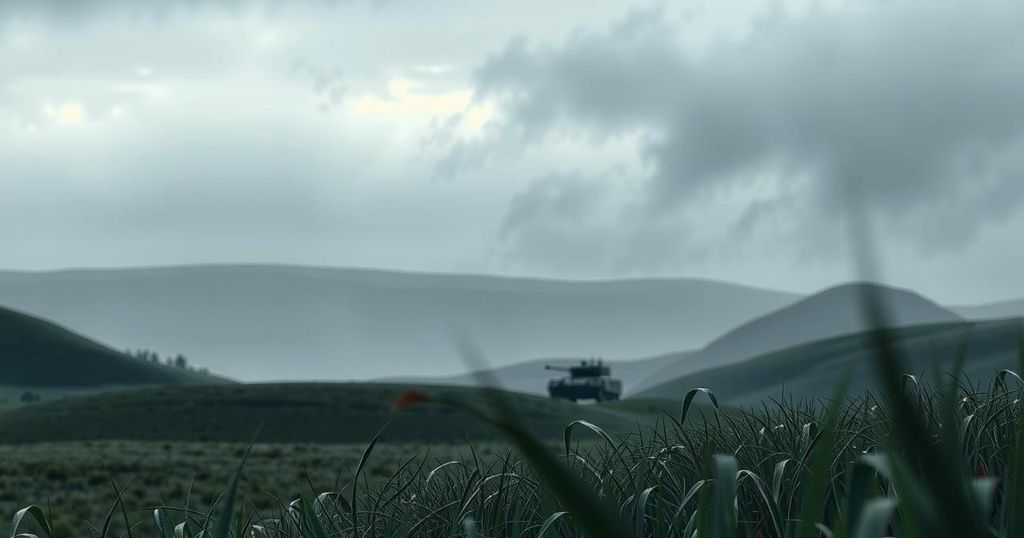Sudanese Army’s Strategic Gains: 2025 Report on Conflict Dynamics
A report by African Narratives for Strategic Studies outlines significant recent advances by the Sudanese army in early 2025, showcasing captures of vital areas such as Wad Madani, Khartoum Bahri, Umm Rawaba, and the Jelei refinery. Despite these military successes, the humanitarian situation remains dire, with millions displaced. The army’s continued efforts to counter the RSF militia indicate a determined pursuit of military resolution, raising questions about future stability in the region.
A recent report from African Narratives for Strategic Studies reveals substantial progress made by the Sudanese army in early 2025 amidst an ongoing conflict in Sudan. The study highlights how these military advancements may significantly alter the war’s dynamics, exploring their implications for the future of the crisis in Sudan. The organization aims to reshape international perspectives on Africa, emphasizing pressing challenges such as democracy, security, and human rights.
The report, authored by Political Science Researcher Ahmed Gamal El Sayyad, titled “Military Situation Assessment in Sudan 2025,” delves into battles fought between January and February 2025. It acknowledges the severe humanitarian impacts of the conflict, with millions displaced, but notably emphasizes military successes, particularly the reclaiming of strategic territories and resources by the Sudanese army.
Key locations recaptured by the army include:
1. Wad Madani: The capital of Al-Jazeera State, crucial for its economic and demographic significance.
2. Khartoum Bahri: The army’s advances here led to pushing back the Rapid Support Forces (RSF) militia.
3. Umm Rawaba: A strategically vital city in North Kordofan State, successfully retaken.
4. Jelei Refinery: Securing the largest oil refinery in Sudan was a significant military victory.
The report elaborates on specific military operations that facilitated these gains, such as artillery assaults on RSF locations in Khartoum Bahri and intense confrontations in the Shambat suburb. Assistant Commander-in-Chief Yasser Al-Atta stated that “Khartoum Bahri has become clean and free of rebellion, from the Jelei refinery in the north to the Mak Nimr Bridge in the south,” reflecting the army’s confidence in their controlled areas.
The strategic importance of these locations is underscored in the report. Control of Khartoum Bahri secures River Nile State and lessens the threat to Omdurman. The army’s hold over Mak Nimr Bridge enhances access to significant areas, and reclaiming Wad Madani strengthens its position in the Al-Jazeera region.
While progress is evident, the continuing humanitarian crisis and the ongoing threat posed by the RSF are crucial considerations. The report also indicates that the Sudanese army intends to form a transitional government, led by Abdel Fattah Al-Burhan, aimed at overcoming the RSF, suggesting a commitment to a military resolution.
The conflict in Sudan has persisted for years, leading to severe humanitarian crises and significant displacement of populations. The Sudanese army has faced challenges mainly from the RSF militia, necessitating a reevaluation of strategies in the face of prolonged conflict. Understanding recent military developments is essential for analyzing future possibilities for peace and stability in Sudan. African Narratives for Strategic Studies aims to provide analysis rooted in local voices, facilitating informed discussions on critical issues affecting Africa. The report focuses on the military situation in Sudan as it stood in early 2025, taking into account the recent successes of the army. By examining these developments, the report seeks to provide insights into the shifting dynamics of the conflict, the strategic importance of regained territories, and the broader implications for regional stability, as well as the humanitarian situation.
The report from African Narratives for Strategic Studies highlights recent gains by the Sudanese army, pointing towards a potential shift in the military landscape of the ongoing conflict. Despite substantial military victories, the humanitarian crisis persists, and the RSF remains a formidable adversary. The intention for a transitional government underlines a strategic push by the army to pursue a military victory, leaving open questions about the future peace process and stability in Sudan. The findings merit the attention of the international community as it navigates this ongoing crisis.
Original Source: www.dailynewsegypt.com








Post Comment